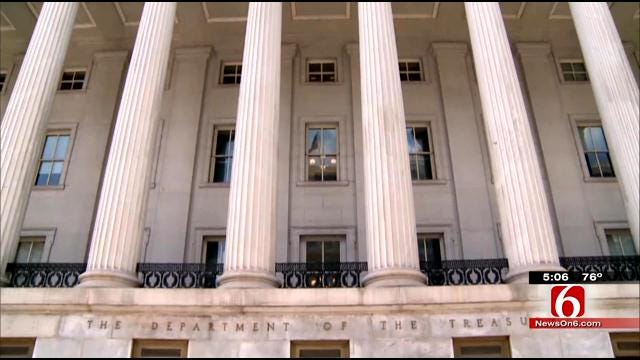Oklahomans Should Be Cautious Of Largest IRS Scam In History
Some scammers are banking on the opinion, that to most people, there's nothing scarier than the IRS. Con artists are targeting thousands of Americans in the largest scam in IRS history.Friday, March 21st 2014, 6:39 pm
Some scammers are banking on the opinion, that to most people, there's nothing scarier than the IRS. Con artists are targeting thousands of Americans in the largest scam in IRS history.
The Better Business Bureau said it gets calls like this daily, and Oklahomans should always be cautious when someone calls requesting money or personal information.
Tulsa resident, Misty Bart, said her husband got a threatening call from a random man saying if he didn't pay off bank loans, he would be arrested.
"The man stated that we owe over $600 in bank loans," Bart said. "If he didn't pay him the $600 by that day, that he would be arrested at work within three days."
Although the man didn't tell the Bart family he was with the IRS, the federal agency said crooks are using a similar method to steal money from taxpayers.
Thousands of victims have lost more than $1 million to people posing as IRS agents. The U.S. Treasury is calling it the largest scam of its kind.
"It scares me. I know people, elderly people and regular people, that will do it because the idea of jail time is scary to people," Bart said.
Callers tell their intended victims they must pay using a prepaid debit card or wire transfer. Scammers threaten arrest, deportation or loss of your driver's license if you don't pay immediately.
"He was very irate, especially when my husband called him back later on that day to tell him that he knew it was a scam and that we weren't going to be sending him any money at all," said Bart.
The IRS said it will never call you, but it will send a letter in the mail. If you get a call from someone claiming to be with the IRS and you owe federal taxes, hang up and call the IRS directly.
If you don't owe taxes, report the incident to the Treasury inspector general. You can also file a complaint online with the Federal Trade Commission.
People have reported getting emails, but the IRS said it will never email you either. If you get one of those emails, do not open any attachments and forward the email to phishing@irs.gov.
More Like This
March 21st, 2014
September 29th, 2024
September 17th, 2024
Top Headlines
December 11th, 2024
December 11th, 2024
December 11th, 2024












